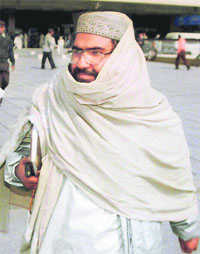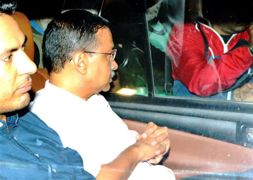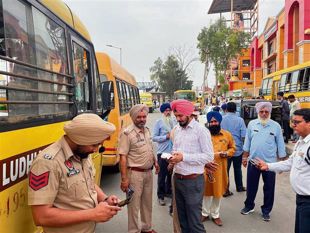
Maulana Masood Azhar. PTI
Arun Joshi
Before he founded the terror outfit, Jaish-e-Mohammad, Maulana Masood Azhar was a prisoner in the Kot Bhalwal jail in Jammu. On the night of December 30, 1999, mandarins from New Delhi, including the former RAW Chief A.S. Dulat, flew to Jammu to persuade the then Jammu and Kashmir chief minister Farooq Abdullah to order Masood Azhar's release.
The soul of pan-Islamic militancy in South Asia, the urgency to secure his release was because Harkat-ul-Mujahadeen men, in connivance with Lashkar-e-Toiba, an off-shoot of the Al-Qaida, had hijacked the Indian Airlines airbus IC 814 on its way from Kathmandu to Delhi. There was pressure on the NDA government, led by Atal Behari Vajpayee, to free Masood Azhar and two others, Mushtaq Zargar of Kashmir, and Ahmad Omar Sayeed Sheikh of Pakistan. Omar later killed Wall Street Journal's South Asia Bureau Chief Daniel Pearl in Karachi.
Twice before Masood Azhar's men had attempted to secure his release. In 1994, it was done by a group called Harkat-ul-Ansar. Two Britishers, including the son of a British journalist based in Delhi, were kidnapped from the woods of Pahalgam. And, in July 1995, an hitherto unknown group Al-Faran had kidnapped six foreigners from Aaroo on the upper reaches Pahalgam in South Kashmir. The demand in both the cases was for the release of Azhar Masood. The Indian Airlines plane was hijacked in December 1999 to achieve the same objective.
On the night of December 30, Farooq Abdullah had refused to release Azhar but yielded after pressure from Delhi, especially from the then Union Home Minister L K Advani and Foreign Minister Jaswant Singh.
Incidentally, Masood Azhar's arrest in 1994 was accidental. He was caught while travelling in an autorickshaw in Anantnag. Why was Azhar so important for the militant groups and the ISI that had sent him to Jammu and Kashmir on a fake Portuguese passport?
Radha Vinod Raju, a brilliant investigator and founder of the NIA, the then Inspector General of Police, Jammu, explained, “Azhar is a strategic asset for Pakistan's ISI. They can afford to get any number of militants killed, but they need someone who can motivate the young to pick up guns to kill or die. They are cannon fodder. He is an ideologue. That's the difference.” Before ordering the release of Azhar, the chief minister who had taken a similar stand against the release of Jammu and Kashmir Liberation Front men to secure the release of then Union Home Minister Mufti Mohammad Sayeed's youngest daughter Rubaiya Sayeed, had warned of big trouble once Azhar was released. Delhi did not heed the advice. The impression was that Farooq Abdullah was not interested in saving the lives of crew and passengers of the hijacked aircraft parked in Kandahar, the capital of Taliban in Afghanistan .
Azhar had founded Jaish-e-Mohammad when he reached Pakistan soon after his release. He was the mastermind of many terror attacks, including the one on the Indian Parliament on December 13, 2001. After the attack on the Pathankot Air Force base, there is a sudden urgency in getting the custody of the Jaish-e-Mohammad chief. This is necessitated by the national security and foreign policy imperatives. The Indian establishment is haunted by the fear that the idea of Masood Azhar could spell more disasters. A terror group that could reach a high-value asset like the Air Force base, is capable of doing anything. Now China too has come to the aid of Pakistan. China has blocked the Indian request to declare Azhar as a terrorist so that UN sanctions can be imposed on him. But the Chinese Permanent Representative at the U N Liu Jieyi said that Azhar did not qualify as a terrorist. Though in reel-life, getting Masood Azhar like Hafiz Sayeed could be the storyline of a Bollywood thriller, in reality untold damage has been done. It is a classic case of the flip-flop policy of the government. At the time of Masood's release, India secured the release of 165 crew members and passengers of the hijacked plane. There is no count of the many more who have been killed in the attacks sponsored by Jaish-e-Mohammad since the release. He was on trial in a Jammu court, but he could not be convicted. Instead, men who escorted him to the court, believed that he had spiritual powers and asked him for a taweez (amulet) to guard against evil spirits and help to solve their domestic and professional problems. Such was the aura of Masood Azhar among his jail mates and others .
Without going into details about how the Indian system succumbed to the hysterical images of the relatives and friends of the captive passengers flashed by TV channels, the fact is that even if the terror mastermind is handed over to India — which in any case would never happen — there is no guarantee that the Indian leadership and bureaucratic system will not repeat the mistake as they had done on December 31, 1999.
On the eve of the millennium In India, there were celebrations over the release of a man who had motivated militants. Can there be a more tragic story than this?



























